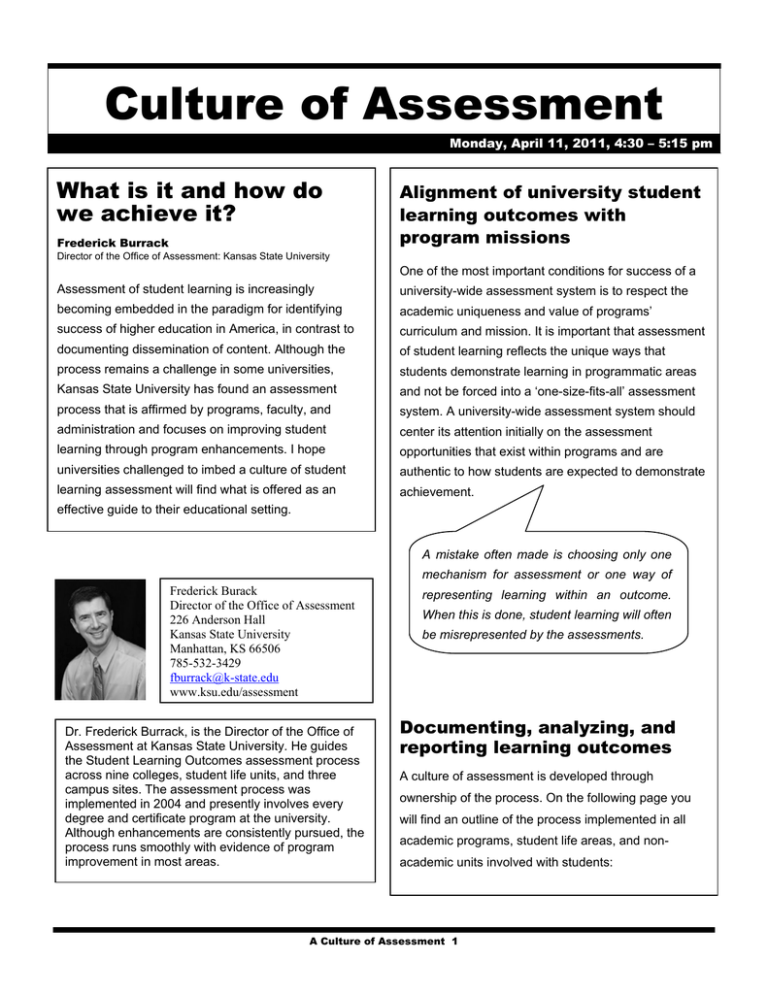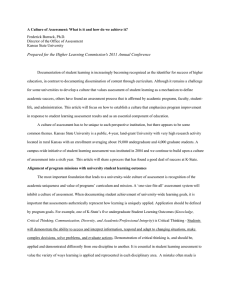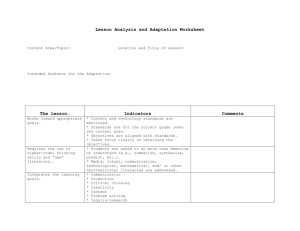Culture of Assessment What is it and how do we achieve it?
advertisement

Culture of Assessment Monday, April 11, 2011, 4:30 – 5:15 pm What is it and how do we achieve it? Frederick Burrack Alignment of university student learning outcomes with program missions Director of the Office of Assessment: Kansas State University One of the most important conditions for success of a Assessment of student learning is increasingly university-wide assessment system is to respect the becoming embedded in the paradigm for identifying academic uniqueness and value of programs’ success of higher education in America, in contrast to curriculum and mission. It is important that assessment documenting dissemination of content. Although the of student learning reflects the unique ways that process remains a challenge in some universities, students demonstrate learning in programmatic areas Kansas State University has found an assessment and not be forced into a ‘one-size-fits-all’ assessment process that is affirmed by programs, faculty, and system. A university-wide assessment system should administration and focuses on improving student center its attention initially on the assessment learning through program enhancements. I hope opportunities that exist within programs and are universities challenged to imbed a culture of student authentic to how students are expected to demonstrate learning assessment will find what is offered as an achievement. effective guide to their educational setting. A mistake often made is choosing only one mechanism for assessment or one way of Frederick Burack Director of the Office of Assessment 226 Anderson Hall Kansas State University Manhattan, KS 66506 785-532-3429 fburrack@k-state.edu www.ksu.edu/assessment Dr. Frederick Burrack, is the Director of the Office of Assessment at Kansas State University. He guides the Student Learning Outcomes assessment process across nine colleges, student life units, and three campus sites. The assessment process was implemented in 2004 and presently involves every degree and certificate program at the university. Although enhancements are consistently pursued, the process runs smoothly with evidence of program improvement in most areas. representing learning within an outcome. When this is done, student learning will often be misrepresented by the assessments. Documenting, analyzing, and reporting learning outcomes A culture of assessment is developed through ownership of the process. On the following page you will find an outline of the process implemented in all academic programs, student life areas, and nonacademic units involved with students: A Culture of Assessment 1 continued from page 1 Developing a Culture of Assessment through ownership of the process Each program/unit identifies student learning goals essential for every student and the specific outcomes that represent these goals. The program/unit outcomes are tied to university outcomes. Programs/units identify where these skills/knowledge/dispositions are taught throughout the program and at what point achievement is expected. The assessments used in courses within the curriculum that identify successful learning are used annually to document student achievement over time. Programs/units annually report student learning data for outcomes to their program faculty and administration. Reports are reviewed by College Assessment Review Committees resulting in feedback to the programs/unit and college summaries of student achievement to the Dean and university assessment office. Feedback from the Office of Assessment is provided to college’s, CARCs, and program/units. Revision to curriculum, assessment processes, and course content are implemented as a response to assessments and feedback. The assessment cycle repeats annually. Evaluating and improving the effectiveness of the assessment efforts K-State’s Office of Assessment maintains records of student learning assessments for each program / unit / college / division. A rubric is used to identify the level of student learning assessment achieved in the following areas: (1) the quality of student learning outcomes, (2) variety and appropriateness of assessments, (3) documentation of assessment results, (4) faculty involvement, and (5) program initiatives resulting from the assessment findings. Feedback and discussions with assessment facilitators strive to continually move the university toward stronger rigor in assessment. Supporting Effective Assessment The Office of Assessment hosts an annual assessment showcase every fall during which programs share examples of best-practice with their colleagues. The showcase recognizes effective assessment efforts with a framed certificate presented by the Provost and Senior Vice President. To further establish a culture of shared assessment, faculty and unit representatives are intentionally asked to attend conferences on assessment of student learning and effective learning. The paradigm we are hoping do develop is that assessment of student learning is an organized mechanism for self-review and program improvement. Implemented for the purpose of enhancing student learning and not as an activity that is requested by external reviewers or a university initiative. Authentic Evidence of Learning The culture of assessment desired for higher education must be centered on providing evidence to document learning authentic for the discipline, and not from generalities obtained from assessments unrelated to what a student learns and how the learning is represented. A unified understanding associated with student learning assessment is essential for any system to result in significant improvements. Elements of understanding that support a culture of assessment include: assessment of student learning as an essential element of education. the primary purpose of assessment being program improvement. involvement of everyone associated with student learning. an understanding that content presentation should not presume the occurrence of learning. application of knowledge, cognitive skills, dispositions, and workplace readiness. ownership of the assessment process belongs to the programs and units associated with student learning. When the purpose of assessment is clear and respectful of the instruction that leads toward student learning, a culture of assessment will develop and flourish. A Culture of Assessment 2


